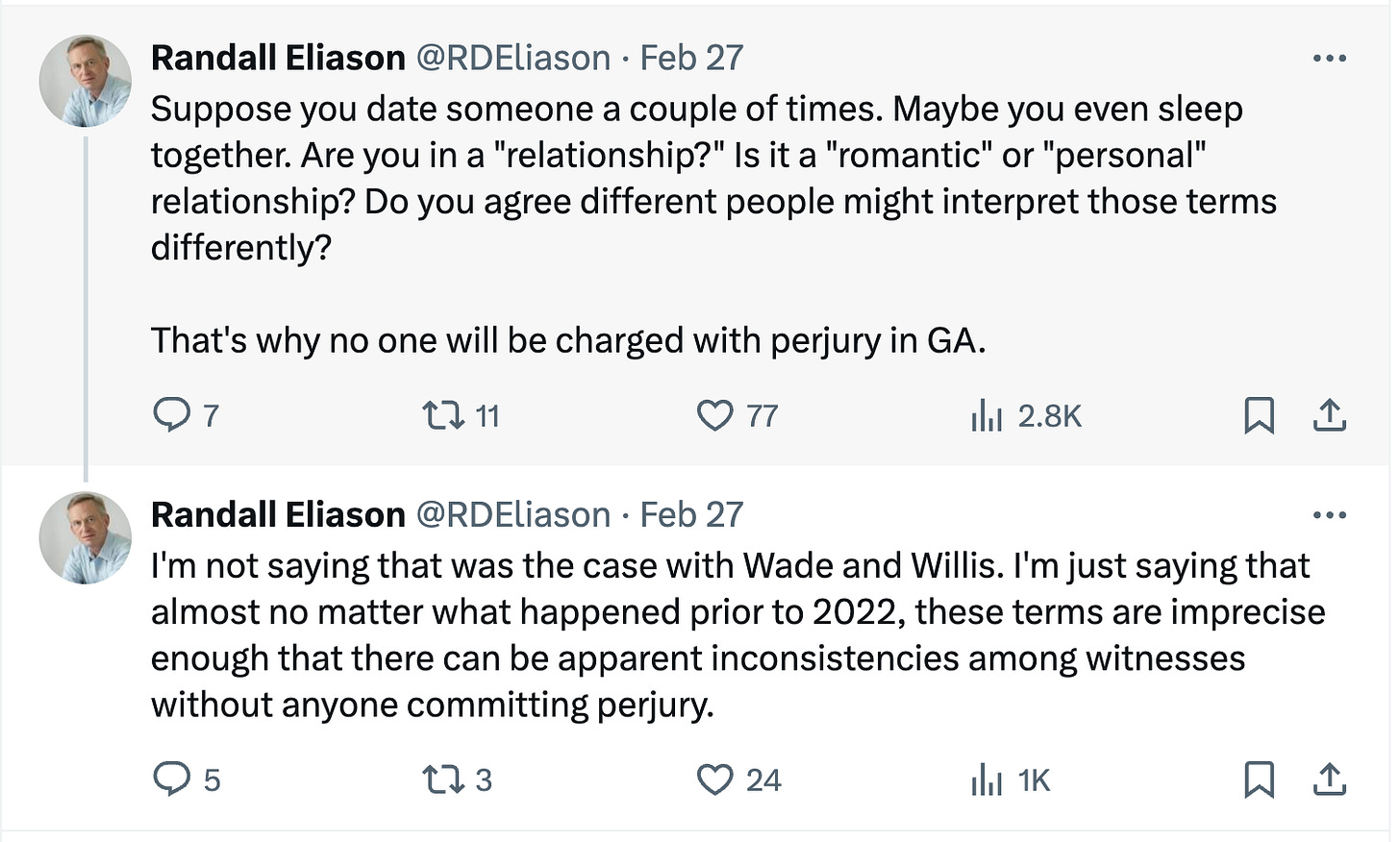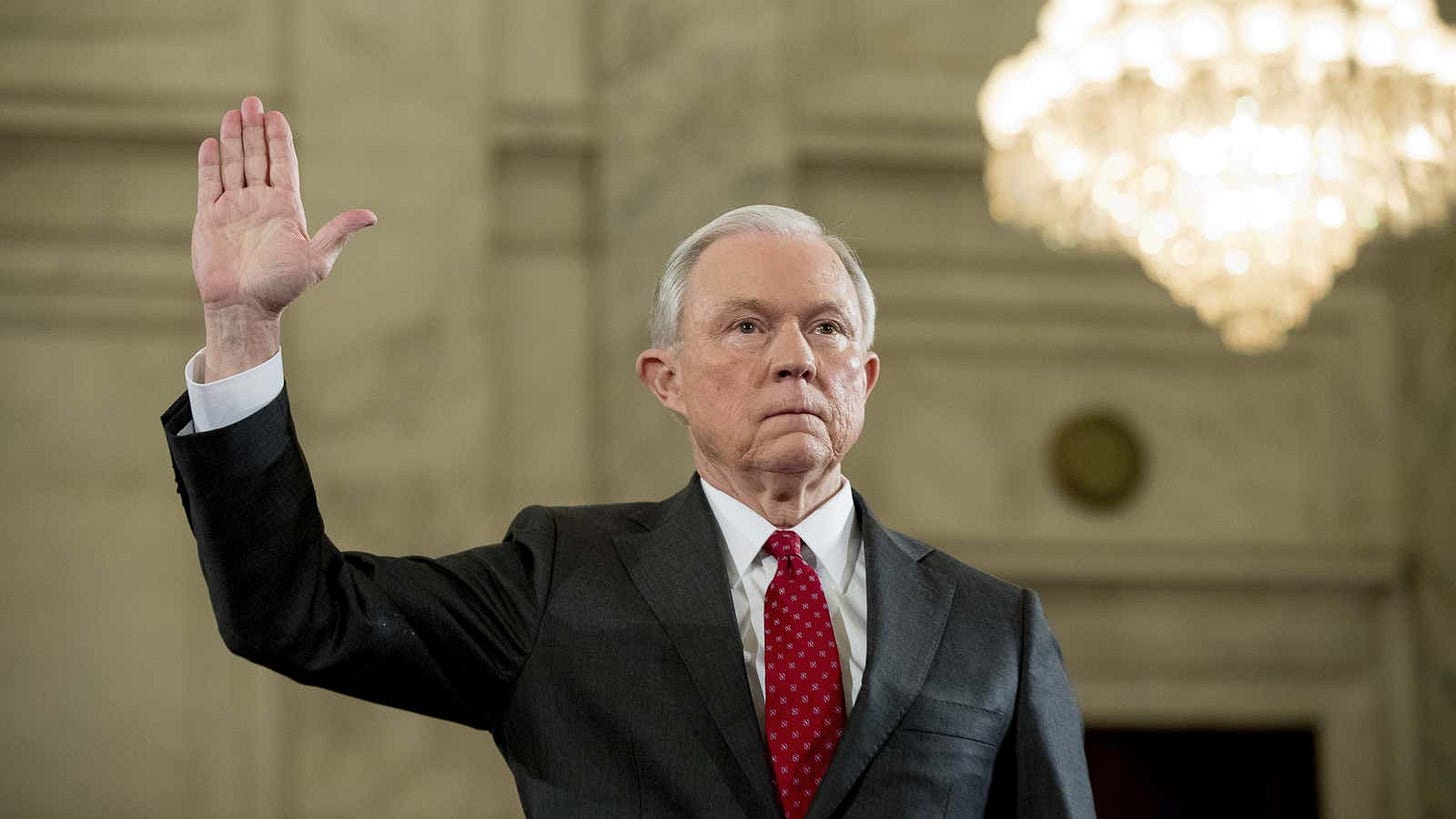Perjury!
From the archives
While I’m away on travel, I’m sharing posts from the Sidebars archive.
Accusations of perjury are tossed around frequently and easily. Particularly in Washington, where I live, whenever a witness on Capitol Hill says something that ends up being false or misleading, cries of “perjury!” soon follow.
Most recently, we’ve seen this on display in Georgia in the hearings on whether DA Fani Willis should be disqualified based on her relationship with a special prosecutor she hired, Nathan Wade. Wade and Willis both testified that they first met in 2019 and had a professional relationship and friendship, but that their “personal relationship” did not begin until 2022. A defense witness testified that she had seen Wade and Willis kiss or hug prior to 2022 and that she had “no doubt” that their relationship began earlier. Wade’s former law partner was confronted with text messages in which he told a defense attorney that the relationship “absolutely” began before Willis hired Wade in November of 2021.
Many were quick to accuse Wade and Willis of perjury. But witnesses and lawyers during the hearing used “relationship,” “personal relationship,” and “romantic relationship” almost interchangeably, without any agreement on what they meant by those terms. And those are the shoals upon which perjury cases founder.
Here’s what I posted on The Platform Formerly Known as Twitter:
Inconsistencies in testimony don’t always mean perjury. Usually it’s something else. Someone is mistaken, or formed a misimpression, or is using terms in a different way. Sometimes a witness is deliberately evasive without crossing the line into actual perjury. A witness may misinterpret or misunderstand a question. The nature of language and human recollection makes it extremely difficult to prove beyond a reasonable doubt that someone is deliberately and knowingly lying, as required for a perjury prosecution.
Jeff Sessions (Credit: Andrew Harnik/AP)
Years ago, when Jeff Sessions was nominated to be President Trump’s attorney general, he was accused of committing perjury during his confirmation hearing when he denied having any contacts with Russian officials during the presidential campaign. Back then I wrote this post about how difficult perjury cases are to prove, using the Sessions testimony as an example. The same principles apply to the testimony of Willis and Wade:
Why Jeff Sessions Is Unlikely To Face Perjury Charges
Did Jeff Sessions commit perjury? Washington is abuzz over whether the new Attorney General may have lied during his confirmation hearing before the U.S. Senate. During his sworn testimony and in a written questionnaire, Sessions denied having any communications with Russian officials during the course of President Trump’s campaign.
Partly as a result of these accusations, Sessions ended up recusing himself from all matters related to Russian interference with the election. That ultimately led to the appointment of Special Counsel Robert Mueller. Mueller looked into the allegations against Sessions as part of his investigation. He concluded that perjury charges would not be appropriate, largely for the reasons I discuss in the article.
Fani Willis may end up being disqualified for creating at least an appearance of impropriety. But it would take a lot more than differing witness statements about when a “relationship” began, and what exactly that means, to prove that someone committed perjury.




Given all the power a prosecutor has -- like sending people to jail -- his or her character must be beyond reproach of something real close to it. Ms. Willis's falls well short of that standard, and she's making things worse by claiming, falsely, that questions about her behavior are just a product of racism. (Minority defendants often use that same sleazy dodge when attacking AUSAs). The judge should talk to her privately and ask her to consider whether the statesmanlike thing to do here -- something that would build her reputation in the long run -- is to withdraw and let another, senior attorney handle it. I'd give her a chance to think it over. If she won't, I'd boot her on the grounds that it's critical to the interests of justice for the public to be able to have maximum confidence in the outcome of the case, whatever it might be.